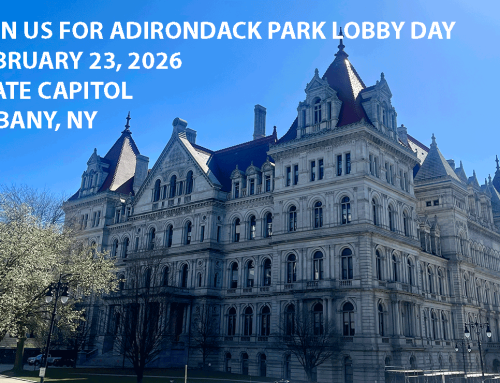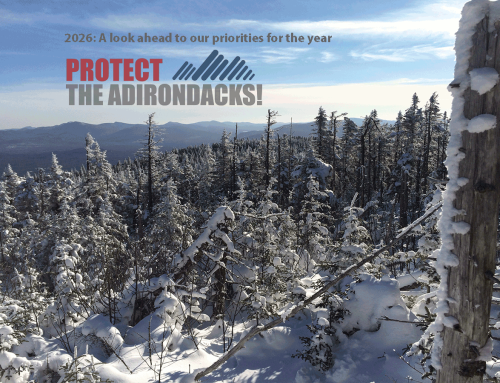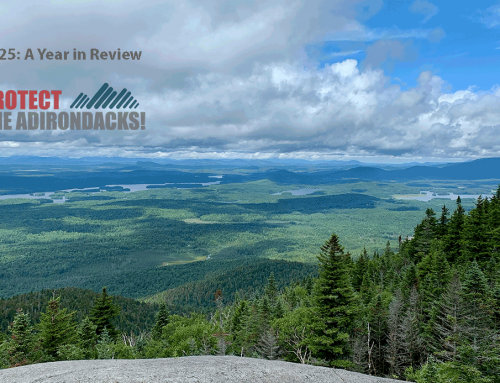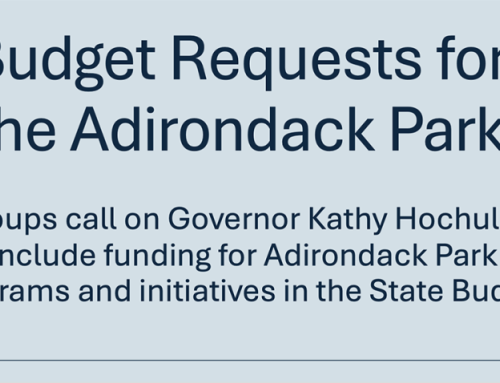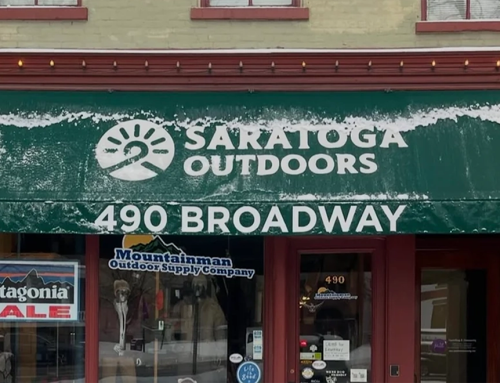Vote Yes on Tuesday November 8, 2022 and support the $4.2 billion Clean Air, Clean Water, and Green Jobs Environmental Bond Act!
Vote Yes on Proposal 1!
On November 8, 2022, New Yorkers will be asked to vote on a $4.2 billion Clean Air, Clean Water, and Green Jobs Bond Act. Protect the Adirondacks supports this Bond Act, which we see as a once-in-a-generation opportunity to make a massive investment in the protection of New York’s natural resources and make a down payment on transitioning to a durable climate change resilient infrastructure. In all corners of New York, local municipalities are crying out for infrastructure funding to help meet pressing demands for vital improvements to public water systems, water quality protections, flood control mitigation, wetland restoration, shoreline and coastal protections, and to help protect the most sensitive and beautiful wild areas in the state. We encourage all New Yorkers to “VOTE YES ON PROPOSAL 1” on Election Day on November 8th!
Once the Clean Air, Clean Water, and Green Jobs Bond Act is passed by New Yorker on Election Day on November 8th, it will enable historic investments in New York’s environment while creating jobs across the state. Bond Act programs will protect clean air and water, reduce flooding, prevent pollution, modernize infrastructure, build parks, advance environmental justice, and support or create over 80,000 jobs.
The Clean Air, Clean Water, and Green Jobs Bond Act is a vital and massive investment in New York State’s environmental sustainability, public health and safety, climate change resilience, and economic vitality for generations of New Yorkers to come.
Here’s the ballot language for Proposal 1:
“To address and combat the impact of climate change and damage to the environment, the “Clean Water, Clean Air, and Green Jobs Environmental Bond Act of 2022″ authorizes the sale of state bonds up to four billion two hundred million dollars to fund environmental protection, natural restoration, resiliency, and clean energy projects. Shall the Environmental Bond Act of 2022 be approved?”
We say, VOTE YES!
What is a Bond Act?
A bond act is a governmental action to authorize a state (or city, village, town, or county) to borrow money to fund a public benefit project. Once a bond act is approved by the voters of the state (or municipality), bonds are issued that are purchased by investors. These bonds are essentially loans that the state/municipality will repay to the bondholders over a fixed period of time according the the terms of the bond. Theses bonds will be repaid within at least 30 years, and bond act money may only be used for a series of capital projects described below. Only authorized projects, delineated in the enabling legislation, can be funded with bond act monies.
Bond Act Will Create/Support Jobs, Leverage Additional Environmental Spending
Based on an economic impact analysis, the report found that the Clean Air, Clean Water, and Green Jobs Bond Act could create or support 84,000 jobs in New York. This results from an estimated $8.7 billion in project spending, broken into the following categories:
- An estimated $4.1 billion to protect and repair natural areas to reduce harmful flooding, supporting 38,700 jobs in New York;
- An estimated $1.9 billion for clean water projects, supporting 20,800 jobs in New York;
- An estimated $1.7 billion to mitigate climate change, supporting 18,100 jobs in New York;
- An estimated $1.1 billion to preserve open space, supporting 6,300 jobs in New York.

Climate change has dramatically altered precipitation patterns in New York State with severe weather and storms becoming more frequent.
Here is a breakdown of the $4.2 billion Clean Air, Clean Water, and Green Jobs Bond Act environmental spending.
Bond Act will spend $1.5 billion on Climate Change Mitigation
At least $500 MILLION for zero emission school buses and supporting infrastructure.
At least $400 MILLION for green buildings, energy efficiency or renewable energy on state-owned properties, SUNY/CUNY, community colleges and public schools.
At least $200 MILLION for air and water pollution elimination in environmental justice communities.
At least $100 MILLION for climate adaptation and mitigation projects.
Other eligible projects:
- Urban heat reduction through green roofs, open space, community gardens, cool pavement, community cooling centers, and reflective roofs;
- Urban forestry projects such as forest and habitat restoration, planting of street trees;
- Protect natural and working lands that store or reduce carbon or methane pollution from agricultural lands.
Bond Act will spend $650 Million on Water Quality Improvement and Resilient Infrastructure
At least $200 MILLION for wastewater infrastructure upgrades and repairs.
At least $250 MILLION for municipal stormwater projects.
Other eligible projects:
- Reduce soil loss and runoff from farms, improve soil health, and restore buffers between farms and streams;
- Reduce harmful algal blooms and water pollution;
- Extend or establish sewer lines to replace polluting septic systems;
- Reduce water pollution by eliminating point or nonpoint source discharges;
- Reduce lead exposure by replacing lead service lines.
Bond Act will spend $650 million on Open Space Conservation and Recreation
At least $300 MILLION for open space land conservation.
At least $150 MILLION for farmland preservation At least $75 MILLION for fish hatchery creation and upgrades.
Other eligible projects:
- Land and farmland conservation projects with willing landowners/sellers;
- Fee or easement purchases by the state, a municipality, or a not-for-profit organization;
- Planning, design, construction of projects to develop and improve parks, campgrounds, nature centers, fish hatcheries, and other recreational facilities.
Bond Act will spend $1.1 billion on Restoration and Flood Risk Reduction
At least $100 MILLION for coastal rehabilitation and shoreline restoration.
At least $100 MILLION to reduce inland flooding and revitalize waterfronts.
$250 MILLION for flood buyouts and associated costs.
Other eligible projects:
- Restore natural areas and wildlife habitat including wetlands, streams, and forests;
- Protect people, roads, and buildings from flooding by acquiring, moving, lifting, or raising flood-prone properties, structures, and infrastructure;
- Relocate, repair, or raise flood-prone roadways; and update dams, bridges, and culverts.
Vote Yes on Tuesday November 8, 2022 and support the $4.2 billion Clean Air, Clean Water, and Green Jobs Environmental Bond Act!



